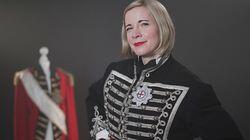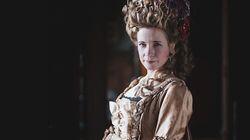Royal History's Biggest Fibs with Lucy Worsley - Season 2

Season 2

Episodes

French Revolution
'Let them eat cake!' is one of the most famous phrases of history and one that everyone associates with the French Revolution. But did Marie Antoinette – the queen of France - really say it? In this film, Lucy Worsley explores some of the myths and fibs swirling around the Revolution of 1789 and the uprising that brought down the French royal family. This violent revolution became the blueprint of many future revolutions across the world. But what happened during this turbulent period is open to historical manipulation and interpretation.
Lucy discovers that Marie Antoinette never said, 'Let them eat cake'. This was a fib used by later historians to help explain why the revolution happened. Historian Michael Rapport explains how the revolution was not started by starving peasants, as many assume but was, in fact, sparked by a group of lawyers and property owners. Along the way, Lucy finds out that Maximilien Robespierre wasn't simply a bloodthirsty revolutionary who relished violence and wanted to execute everyone who disagreed with him. In his earlier years, he stood against the death penalty and slavery and fought for the rights of France's Jewish population. And the guillotine was invented by the revolutionaries not as a brutal punishment but as a more egalitarian and humanitarian form of execution.
Depending on your politics and your nationality, Lucy finds out that everyone has a very different take on the French Revolution.

George IV and the Regency
Lucy Worsley finds the fibs behind the facade of Georgian elegance and discovers how the story of Regency Britain – from Waterloo to Peterloo – was spun to avoid revolution.
We think of the Regency as genteel and well-ordered: beautiful buildings, Jane Austen's romances, and red-coated officers defeating Napoleon at Waterloo. Lucy Worsley digs behind the facade of Georgian elegance to reveal the fibs that helped conceal a darker side to the Regency and suppress rebellion in an age of revolution.
This was the end of the Georgian era when a mentally ill King George III was forced to hand power to his extravagant son – the prince regent and future King George IV. Both kings lived in the shadow of the French Revolution and the rise of Napoleon.
To make matters worse for the royals, British radicals were demanding political reform. To stop rebellion, monarchy and government relied on spin, secrets, and lies. Lucy reveals how an international victory at Waterloo became distinctly British, why the Peterloo Massacre was airbrushed out of history, and how Scotland was dressed up in tartan to support the union.

Russian Revolution
We think we know the story of the Russian revolution - in October 1917, the Bolsheviks rose up, swept the tsar from power, and communism was born. In this film, Lucy explores the myths and fibs that swirl around the dramatic events of 1917. She finds it was really a group of women workers who kick-started the Russian Revolution in February 1917. At the time, the Bolsheviks tried to stop it, and Lenin, the radical leader of the Bolsheviks, wasn't even in the country.
Lucy discovers that the tsar was forced to abdicate long before the Bolsheviks took control. And she finds out how King George V betrayed his cousin by opposing the British government's offer of asylum to the tsar and his family. This was kept secret for decades.
Along the way, Lucy reveals how the Bolsheviks used films and books to big up the October revolution while belittling the February revolution as irrelevant and bourgeois. And when Lenin died in 1924, Stalin lied his way to the top - he repressed Lenin's last wishes and faked paintings and photographs to support his claim to be Lenin's chosen successor.
Recently Updated Shows

NCIS
NCIS (Naval Criminal Investigative Service) is more than just an action drama. With liberal doses of humor, it's a show that focuses on the sometimes complex and always amusing dynamics of a team forced to work together in high-stress situations. Leroy Jethro Gibbs, a former Marine gunnery sergeant, whose skills as an investigator are unmatched, leads this troupe of colorful personalities. Rounding out the team are Anthony DiNozzo, an ex-homicide detective whose instincts in the field are unparalleled and whose quick wit and humorous take on life make him a team favorite; the youthful and energetic forensic specialist Abby Sciuto, a talented scientist whose sharp mind matches her Goth style and eclectic tastes; Caitlin Todd, an ex-Secret Service Agent; and Timothy McGee, an MIT graduate whose brilliance with computers far overshadows his insecurities in the field; Assisting the team is medical examiner Dr. Donald "Ducky" Mallard, who knows it all because he's seen it all, and he's not afraid to let you know. From murder and espionage to terrorism and stolen submarines, these special agents travel the globe to investigate all crimes with Navy or Marine Corps ties.

Landman
Set in the proverbial boomtowns of West Texas, Landman is a modern day tale of fortune seeking in the world of oil rigs. The series is an upstairs/downstairs story of roughnecks and wildcat billionaires fueling a boom so big, it's reshaping our climate, our economy and our geopolitics.

The Creep Tapes
Based on a collection of videotapes in the secret vault of the world's deadliest and most socially uncomfortable serial killer, who hires his victims to film him for the day under false pretenses, each episode exposes a new victim from one of the fabled 'Creep Tapes'.

America's Funniest Home Videos
ABC's longest-running primetime entertainment show, America's Funniest Home Videos, returns for season 36 this fall with the same mission -- giving families something genuinely funny to enjoy together on Sunday nights.
"AFV," the longest-running primetime entertainment show in ABC history, returns for season 36 with the same mission - to provide viewers with hysterical moments that fly by at a dizzying pace.

The Real Housewives of Potomac
Just up the river from our nation's capital lies a hidden gem—Potomac, Maryland. Its rolling hills, gated mansions, sophisticated prep schools, and exclusive country clubs all serve to keep the area invitation-only. Sprinkled throughout this community are a handful of old-line, wealthy African-American families who have historically broken racial barriers to provide a life of privilege for their children. The Real Housewives of Potomac follows the upscale lives of six intriguing, well-to-do women: Gizelle Bryant, Katie Rost, Karen Huger, Charrisse Jackson-Jordan, Robyn Dixon, and Ashley Darby, all of whom have fought for their places in this society by way of legacy or marriage. In a town where entry is granted only through class, pedigree, and lineage, how far will these ladies go to secure their spot at the top of this prestigious circle?